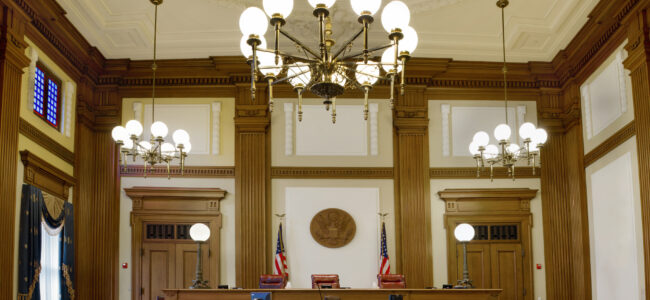BlogLine
The Supreme Judicial Court of Massachusetts Rules that Litigation Privilege Protects Attorney from Civil Liability in First Impression Case
7/14/22

By: Nancy Reimer & Sean Andrés Rapela
On July 1, 2022, in Bassichis v. Flores, the Massachusetts Supreme Judicial Court (“SJC”) held the litigation privilege protected an attorney from liability where he allegedly withheld information from the judge in a divorce proceeding. During the uncontested divorce proceeding, the husband was pro se. The wife’s attorney sought a trial to obtain a judgment as to the division of assets. The husband’s creditors brought an action alleging the wife’s attorney fraudulently withheld information from the judge that could have been used to contest the assertion that the husband had dissipated marital property. Without this information, however, the wife was entitled to all remaining assets, leaving the creditors on the outside looking in. Consequently, the creditors brought suit against the wife’s attorney for fraudulently withholding the information.
The SJC was tasked with determining whether the litigation privilege protected the attorney. The Litigation privilege precludes civil liability based on communications made by a party, witness, or attorney in connection with judicial proceedings or contemplated litigation. Historically, in Massachusetts and other jurisdictions, courts have held the privilege applies regardless of malice, bad faith, or any nefarious motives on the part of the lawyer so long as the conduct complained of has some relation to the litigation. The privilege is seen as good for the public interest and zealous advocacy, as Chief Justice Lemuel Shaw observed,
“[I]t is, on the whole, for the public interest, and best calculated to subserve the purposes of justice, to allow counsel full freedom of speech, in conducting the causes, and advocating and sustaining the rights, of their constituents; and this freedom of discussion ought not to be impaired by numerous and refined distinctions.”
See Hoar v. Wood, 44 Mass. 193, 197–98 (1841). Nevertheless, the privilege does not protect attorneys from their own misconduct, and trial judges have the inherent authority to sanction attorneys for misconduct in the court room.
Here, the Judge needed to determine whether the protection afforded under the privilege applies where the statements at issue are fraudulent misrepresentations. The plaintiff creditors sought to hold the attorney liable for his alleged misrepresentations in the divorce proceedings AND his conduct in “orchestrating” the purported scheme to defraud them. The alleged conduct included scheduling a trial and submitting paperwork to the court.
While a case of first impression in Massachusetts, other states including Florida, Hawaii, Idaho, Texas, Utah, and West Virginia have determined the litigation privilege protects attorneys from liability for actions taken during the course of litigation. These courts determined the litigation privilege extends to both an attorney’s statements and actions in the course of litigation.
The SJC determined the “the litigation privilege ‘is based upon a public policy of providing attorneys, as officers of the court, the utmost freedom in their efforts to secure justice for their clients.’ In light of this policy, ‘we see no reason to distinguish between communications made during the litigation process and conduct occurring during the litigation process.’” See Clark v. Druckman, 218 W. Va. 427, 433 (2005). Moreover, the Court determined to decide otherwise would force attorneys to divide their interest between advocating for their client and protecting themselves.
The SJC, however, noted “a determination that an attorney is immune from civil liability for making fraudulent misrepresentations about material aspects of a client’s case, or for engaging in misconduct, would not shield the attorney from any applicable sanction for conduct contrary to the rules of professional responsibility, nor would it suggest to other attorneys that such behavior is acceptable.”
Thus, Bassichis suggests attorneys should zealously advocate for their clients while abiding by the rules of professional responsibility.
For more information on this subject please contact Nancy Reimer or Sean Andrés Rapela. Stay up to date on our latest thought leadership by subscribing to our newsletter here.
Share
Save Print